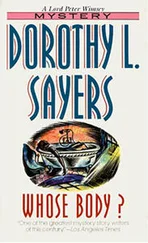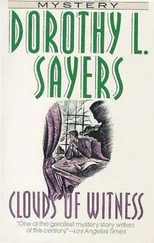Dorothy Sayers - The Wimsey Papers
Здесь есть возможность читать онлайн «Dorothy Sayers - The Wimsey Papers» весь текст электронной книги совершенно бесплатно (целиком полную версию без сокращений). В некоторых случаях можно слушать аудио, скачать через торрент в формате fb2 и присутствует краткое содержание. Жанр: prose_military, на английском языке. Описание произведения, (предисловие) а так же отзывы посетителей доступны на портале библиотеки ЛибКат.
- Название:The Wimsey Papers
- Автор:
- Жанр:
- Год:неизвестен
- ISBN:нет данных
- Рейтинг книги:5 / 5. Голосов: 1
-
Избранное:Добавить в избранное
- Отзывы:
-
Ваша оценка:
- 100
- 1
- 2
- 3
- 4
- 5
The Wimsey Papers: краткое содержание, описание и аннотация
Предлагаем к чтению аннотацию, описание, краткое содержание или предисловие (зависит от того, что написал сам автор книги «The Wimsey Papers»). Если вы не нашли необходимую информацию о книге — напишите в комментариях, мы постараемся отыскать её.
in 1939 and 1940, purporting to be between characters from the Wimsey novels. Aside from their interest to fans of Sayers, who would like to know more about her characters and about her views on the war, they're also interesting pieces of social history — these must be one of the last few pieces of writing where the word 'propaganda' is used in a neutral meaning, for example.
The Wimsey Papers — читать онлайн бесплатно полную книгу (весь текст) целиком
Ниже представлен текст книги, разбитый по страницам. Система сохранения места последней прочитанной страницы, позволяет с удобством читать онлайн бесплатно книгу «The Wimsey Papers», без необходимости каждый раз заново искать на чём Вы остановились. Поставьте закладку, и сможете в любой момент перейти на страницу, на которой закончили чтение.
Интервал:
Закладка:
My dear, this letter is full of shopping and nonsense — but I've made up my mind that we just mustn't worry about Peter, because he disappeared so many times in the last war and always turned up again more or less safe and sound. He's got quite a good instinct of self-preservation, really. And he's not stupid, which is a comofrt, whatever Kingsley has to say about being good and letting who will be clever — though I don't see how you can be clever just by willing. Peter always maintains that Kingsley said "can," not "will," and perhaps he did. I only hope he still has Bunter with him, though if he's gone into any queer place in disguise I can't think what he can have done with him, because if ever a man had "English gentleman's personal gentleman" written all over him, it's Bunter. I had a letter from him yesterday, so discreet it might have been written from Piccadilly, and conveying the compliments of the Season to all the Family, with a capital F.
We're looking forward to seeing you all for Christmas, germs permitting. I hope you won't mind our being over-run with evacuees and children's parties — Christmas Tree and Conjurer in the Ball-Room, with charades and games after supper — I'm afraid it will be rather noisy and rampageous and not very restful.
Always your affectionate
MOTHER
P.S. - I'm sorry my English is so confusing. It was Bunter, not Peter, who wrote the discreet letter, and Peter, not Kingsley, who has Bunter with him — at least, I hope so.
The Wimsey Papers, pt. II
***
10 and 11. Miss Letitia Martin, Dean of Shrewsbury College, Oxford, to Lady Peter Wimsey at Talboys.
ACADEMIC WOMEN'S CLUB,
FITZROY SQUARE, W.1.
18.12.39.
My dear Harriet,
Thank you so much for that lovely book and the delightful photograph of the infants — a most gratifying addition to the portrait-gallery of Shrewsbury grandchildren! I hope my little offering to the nursery will arrive in time. I'm not sending much in the way of presents this year, because what with the income-tax, and cigarettes for soldiers, and scarves for mine-sweepers, and Funds for Distressed Victims (assorted), and subscriptions to entertainments, and Bonds, and Savings, and one thing and another, one's cheque-book just melts away, leaving one bankrupt of all but good wishes. If Sir John Simon would only explain how exactly one is to spend hard to win the Economic War, and at the same time save hard to win the Economic Peace, he would confer a benefit on mere narrow-minded logicians like me — but I suppose the answer is that in war-time one has to do the impossible, and will end by doing it. Anyway, my dear, all my best wishes to you all, and may your lord and master soon return home, with new detective exploits to his credit!
How tremendously the flight off Montevideo has taken hold of one's thoughts! Like the loss of the 'Rawalpindi', it has the unmistakable heroic quality that links it up with all our naval history back to the Armada — one feels that Nelson must have been aboard the 'Exeter,' and that Drake and Grenville helped to command the 'Ajax' and 'Achilles' when they ran in under the 'Graf Spee's' guns. It's good for us to have these reminders, especially just now. "This is a funny war," people say — and I know what they mean. When everything happens at sea, it's rather like two people playing chess. There's a deathly silence, and you don't know quite what they're up to; you only see one piece after another swept off the board and accounted for — a destroyter here, a merchantman there, a black knight exchanged for a white bishop — all queerly impersonal and worked out in terms of things — pieces — so many taken and so many left. And then, suddenly, the combination gets into action, and you see what it was all about, right away from the original gambit — a knight comes dancing across, two little pawns you'd scarcely notice trip forward hand in hand, the black queen is forced into a corner, the knight hops away and unmasks the waiting rook, and plonk! the black queen's gone and the king in check.
It's sobering to read of so many casualties — all one can say is that, if men have to be killed, it's a cause for pride and gratitude to know they the job they were doing is done,and done well. The most heartbreaking thing must be to feel that one's husband or son died for something that turned out badly, or ought never to have happened. And I am most dreadfully sorry for poor Langsdorf. He seemed to have had a very good chit from our people — "a very great gentleman," they said, and he must have simply hated having to scuttle his ship. Of course, it was a bit spiteful to do it right in the middle of the fairway, but no doubt Hitler told him to. I hope there's no truth in the extraordinary rumour that H. offered him a million marks to get the ship home. That would be the last insult. Not that I would put it past the little wretch — he never was out of the top drawer.
Look here, I do think somebody ought to do something to throttle that Haw-Haw creature. I don't mind his having said that half Oxford was in flames, and that the soldiers had to be protected by pickets from the unwelcome attentions of the Women Students. That gave us much harmless pleasure. And I don't mind his pointing out that even the War hasn't stopped unemployment. It's true, and you can't expect him to mention that the same thing is happening in Germany, in spite of the fact that guns are their staple manufacture. It's all part of the world-problem — production having got ahead of distribution — and if everybody stopped fighting tomorrow we should all still have to cope with it. And I don't blame him for saying that our Evacuation hasn't turned out as well as it might, because all our own papers have said it ad nauseam. After all, it's not our fault that Hitler let us down — if only he'd started throwing things when he said he would, everything would have worked out as planned. Our big mistake was to suppose that that man could ever speak the truth, even by accident. And the interesting thing is that quite a lot of people are finding out now how much better their children are doing in those evacuated areas where they're only getting about 1½ hours' teaching a day, in small classes of about a dozen, than they did working a full day in classes of 40 or so. One working woman told me it had given her quite a new outlook on education. And so it should — because those children are getting what only wealthy people can afford as a rule — individual attention from a private tutor. And it just shows that when the war's over we shall just have to overhaul the whole thing, and have more teachers and smaller classes, no matter what it costs; and now that some of these parents have discovered what proper education means, it's up to them to badger the government until they get it. And we shall all of us have to learn to treat the teaching profession decently, and not as a bunch of comic pariahs, or we shan't be able to get enough teachers for the new era in educaiton.
What was I saying about Haw-Haw? Oh, yes! I really cannot stand the creature saying that we called Langsdorf a coward for running into Montevideo. We never dreamed of saying anything of the sort. We went out of our way to throw bouquets. I'm damned if anybody shall call us bad winners — that's worse than being bad losers.
19.12.39
I couldn't finish last night, because I had to go out. Today's papers don't show the 'Graf Spee' business in an awfully good light. Yesterday's first editions took it for granted the captain had gone down with his ship, and I must say the picture today of him and his men grinning all over their faces isn't quite what one expects. Somehow, it's a shock that Nazi cynicism could get as far as their Navy. One isn't surprised when S.S. men are brutal, or when the New Army behave like fiends in Poland, or German airmen bomb open towns, or even when submarines torpedo without warning — they're a new-fangled sort of ship, and one more less excuses them — but one had a feeling that battleships were somehow or other all right. It's funny how the papers feel it. They don't so much point out that Nelson would have turned a deaf ear and blind eye to inglorious instructions from home; they point to the tradition of the 'Scharnhorst' and the 'Gneisenau,' and the say that old Admiral von Spee would have turned in his grave. It's the thought that this vulgar little madman can stretch his hand over half the world and force a decent sea-captain to do a dishonourable action that makes one sick. That's really what we're fighting about — the utter submission of the individual conscience to an ugly system in the hands of one unscrupulous gangster.
Читать дальшеИнтервал:
Закладка:
Похожие книги на «The Wimsey Papers»
Представляем Вашему вниманию похожие книги на «The Wimsey Papers» списком для выбора. Мы отобрали схожую по названию и смыслу литературу в надежде предоставить читателям больше вариантов отыскать новые, интересные, ещё непрочитанные произведения.
Обсуждение, отзывы о книге «The Wimsey Papers» и просто собственные мнения читателей. Оставьте ваши комментарии, напишите, что Вы думаете о произведении, его смысле или главных героях. Укажите что конкретно понравилось, а что нет, и почему Вы так считаете.












